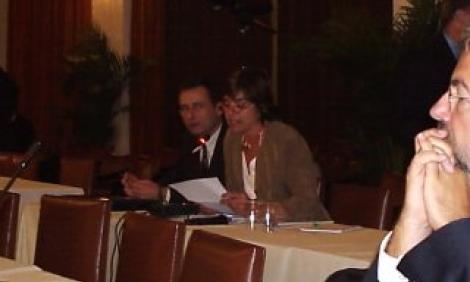In depth
WSIS Rio regional meeting: very few doors open for the gender perspective
By Graciela Selaimen
No participation of civil society as observers in the governmental delegations' meetings; no gender working group in the final regional action plan ELac 2007; almost no women, black people or indigenous people as panelists. Although the Rio WSIS Regional Meeting opened two slots for civil society statements in the plenary and produced documents which were fairly positively received by NGOs and…
In depth
Opening Eyes in Jamaica
By
Hilary Nicholson, member of Women’s Media Watch, shares her experience and impressions on participating in the Global Media Monitoring Day in Jamaica. Her article shows the expectancies and reactions of twelve women who volunteered to participate in this initiative, last February. To some of them, enlightening, to others, unsettling - to all of them an eye-opener experience, after which the…
In depth
Women, Gender & Media
By Jac sm Kee
When I was a trainer at a media and gender workshop in 2002, the only male participant there confessed, “Our organisation is not prioritising gender actually. We are more concerned about other issues – issues which are political”. This statement reveals much about the stand that most media institutions take on gender.
In depth
Linking feminists in Eastern Europe with technology
By
An interview with Natasa Stevanic and Milica Gudovic [milNat] from Women’s Information Technology Transfer (WITT).
In depth
Reflecting on ICTs, Women’s Activism and Silences at Beijing +10 - Interview with Mavic Cabrera-Balleza
By Jac sm Kee
Jac sm Kee speaks with Mavic Cabrera-Balleza of the International
Women’s Tribune Centre about her work using ICTs, and her thoughts on issues of gender and ICT (information and communications technology) policy as well as the challenges facing women’s movements in this respect.
Women’s Tribune Centre about her work using ICTs, and her thoughts on issues of gender and ICT (information and communications technology) policy as well as the challenges facing women’s movements in this respect.
In depth
Politicising ICTs in the Women's Rights Movement - Interview with Lydia Alpízar Durán
By Jac sm Kee
Interview with Lydia Alpízar Durán, Feminist Organizational Development Program Coordinator of AWID (Association of Women in Development) on her thoughts about the relationship between ICTs and movement building in women’s human rights, at the Beijing +10 process, 49th Session of the Commission on the Status of Women, New York.
In depth
New gender and ICT policy monitor helps women make ICT policy a priority
By Kateřina Fialová
Information and communications technologies (ICTs) can assist in bringing food to the table or promoting a reproductive rights agenda and more women need to be involved in the drafting of technology policy. GenderIT.org is a new portal for women and policy-makers just launched by the APC WNSP, APC's women's programme. GenderIT.org is a practical tool for women's organisations so that ICT policy…
In depth
Brazilian women climb in science, but few reach the top
By
Gender equality in Brazilian science is increasing up to doctorate level but few women hold senior scientific posts, according to figures released by the National Council for Scientific and Technological Development (CNPq) and the National Institute for Educational Studies and Research (INEP).
In depth
ICTs for Grassroots: Women from South Asia
By
Like bright flowers in a grey space, the grassroots women of India livened up February’s Prepcom proceedings and it wasn’t just their stylish saris that did the trick. Undaunted by the suits and officialdom of Geneva’s UN machinery, these Indian representatives vigorously demonstrated the value of ICTs in their working lives and made a cogent case for finances to build more equitable ICT…
In depth
What’s Gender got to do with IT?
By Jennifer Radloff
Information and Communication Technologies (ICTs) are being used by women’s organisations to communicate their own agendas and perspectives in order to effect women’s empowerment and social change. But women also need to be involved in the policy processes that define access to and use of these ICTs. This was the message of participants in a panel hosted by the Association for Progressive…










